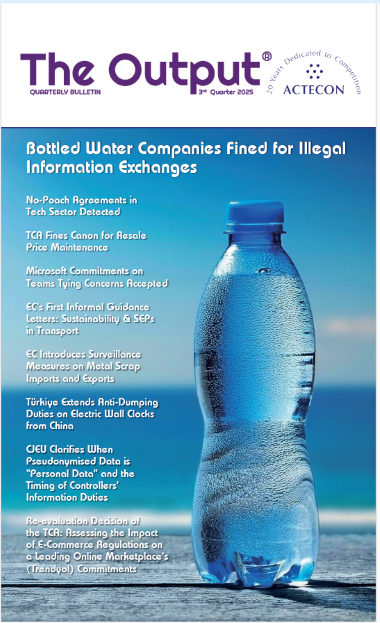Turkey Grants Various Zero-Tariff Rates Through Tariff Quotas
| International Trade

Turkey Grants Various Zero-Tariff Rates Through Tariff Quotas
Article by Ertuğrul Can Canbolat, Hasan Güden and S. İrem Akın
Tariff quota regulations provide for quantities within which imports are charged lower customs duties. By the end of 2018, Turkey established reduced import duties to zero per cent for a pre-determined volume of goods.
The Presidential Decree no 5121 taken on 26 December 2018 set out tariff quotas on imports of certain inorganic acids, certain organic and non-organic chemicals, certain plastics, compressors used in refrigerating equipment, and certain circuit boards for monitor classified under the CN code 85282. Imports of those products will benefit from a zero-tariff rate as of 1 January 2019 provided that they are made within the relevant quotas. Once the quotas are filled, the corresponding customs duty rates provided for in the Import Regime Decision will be applicable.
The Ministry's Communiqués no 2018/8 and 2018/9 on the Administration of Tariff Quotas in Imports implement the afore-mentioned decree3. Those communiqués make the granting of the zero-tariff rate dependent on the request by eligible beneficiaries of an import licence. If the requested amount by eligible importers does not exceed or is equal to the relevant quota, the requests will be satisfied in full. Otherwise, the apportionment of the quota will be made by taking into account one or more of the following criteria: the number of valid requests, the total requested amount, actual consumption, production quantity, production capacity, consumption capacity, the total import quantity, and the optimality in the use of the tariff quotas granted in the previous years to the requesting companies.
Communiqué no 2018/9's scope of application is limited to imports of rosin and resin acids falling under the CN code 3806.10 and of catalyst consisting only of titanium oxide and tungsten trioxide classified under the CN codes 3815.90.10.00.00 or 3815.90.90.00.00. Despite this limited application scope compared to the scope of Communiqué no 2018/8, any company or individual may request an import licence as regards the products covered by Communiqué no 2018/9. Unlike the latter, Communiqué no 2018/8 provides that only producers using the concerned products as raw materials or intermediate goods are eligible to benefit from the zero-tariff rate.
The scope of the Communiqué no 2018/8 – which covers the bulk of the products concerned – being restricted to raw materials and intermediate goods, it seems that the Turkish government wanted to stimulate economic activity in the concerned sectors.
Footnotes
1. See Presidential Decree no 512 published on 27 December 2018 in the Turkish Official Gazette no 30638.
2. See the full list of the CN codes covered by the Presidential Decree no 512 and the corresponding customs duty rate applicable outside the quota (unless otherwise specified, imports of the concerned products from the EU, the EFTA countries, Faroe Islands, Georgia, Bosnia-Herzegovina, South Korea, Malaysia, Singapore, and the D-8 countries are made at a zero-tariff rate): 2811.19.80.90.19 (5,3%), 2903.22 (2% for D-8 countries and 5.5% for others), 2914.19.90 (5.5%), 2915.21 (2% for D-8 countries and 5.5% for others), 2915.32 (2% for D-8 countries and 5.5% for others), 2916.12.00.00.13 (3% for D-8 countries and 6.5% for others), 2926.10 (4.8% for Malaysia, 3% for D-8 countries and 6.5% for others), 3804.00 (5%), 3806.10 (5%), 3815.90.10.00.00 (0%) or 3815.90.90.00.00 (6.5%), 3903.30 (4.8% for Malaysia, 3% for D-8 countries and 6.5% for others), 3905.30.00 (6.5%), 8414.30.81.90.00 (1.1% for Malaysia and 2.2% for others), and 8529.90.92.00.00 (1.5% for D-8 countries and 5% for others) or 9405.40.39.00.00 (1.2% for D-8 countries and 4.7% for others).
3. Both of those communiqués have been published on 28 December 2018 in the Turkish Official Gazette no 30639.







